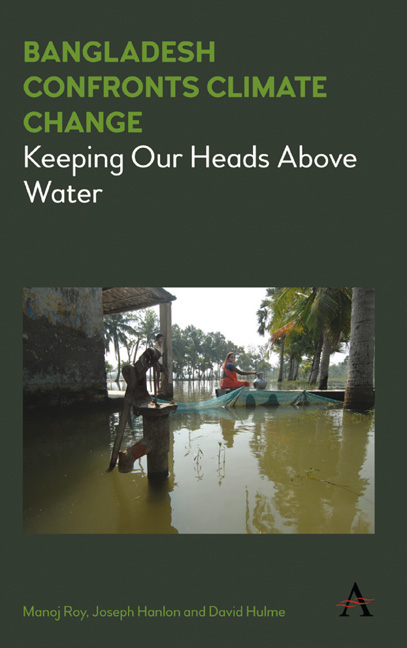Book contents
- Frontmatter
- Content
- List of Illustrations
- Abbreviations, Acronyms and Bangladeshi Terms
- Acknowledgements
- About the Authors
- Chapter One Actors, Not Victims
- Chapter Two How Will Climate Change Hit Bangladesh?
- Chapter Three Taking the Lead in Negotiations – and Moving Forward
- Chapter Four Sea Level Rise and the Vulnerable Coast – Where Farmers Know More than Engineers
- Chapter Five Saving Lives with Cyclone Shelters
- Chapter Six Living with Floods
- Chapter Seven Agronomists Keeping Ahead of Climate Change
- Chapter Eight No Climate Change Migrants – Yet
- Chapter Nine How Can the Privatized Megacity Cope with Climate Change?
- Chapter Ten Is Climate Change Only a Problem for the Urban Poor?
- Chapter Eleven Power – Political, Financial and Electrical
- Chapter Twelve Bangladesh on the Front Line of Climate Change
- Index
Chapter Two - How Will Climate Change Hit Bangladesh?
Published online by Cambridge University Press: 22 July 2017
- Frontmatter
- Content
- List of Illustrations
- Abbreviations, Acronyms and Bangladeshi Terms
- Acknowledgements
- About the Authors
- Chapter One Actors, Not Victims
- Chapter Two How Will Climate Change Hit Bangladesh?
- Chapter Three Taking the Lead in Negotiations – and Moving Forward
- Chapter Four Sea Level Rise and the Vulnerable Coast – Where Farmers Know More than Engineers
- Chapter Five Saving Lives with Cyclone Shelters
- Chapter Six Living with Floods
- Chapter Seven Agronomists Keeping Ahead of Climate Change
- Chapter Eight No Climate Change Migrants – Yet
- Chapter Nine How Can the Privatized Megacity Cope with Climate Change?
- Chapter Ten Is Climate Change Only a Problem for the Urban Poor?
- Chapter Eleven Power – Political, Financial and Electrical
- Chapter Twelve Bangladesh on the Front Line of Climate Change
- Index
Summary
Choices made at the Paris climate change conference in December 2015 and actions after that will determine if Bangladeshis can keep their heads above water, or must flee to high ground. But the real impact of the decisions will only be felt in 50 to 100 years because the fossil fuels we use today and in the near future create ‘greenhouse gases’, which persist in the atmosphere for decades, continuing to warm the planet and having an impact on future generations.
Emission limits proposed by Bangladesh and most developing countries would cause global warming to peak in the middle of this century, followed by a slow fall in temperatures. Bangladesh could cope with those changes. But the industrialized countries, and China and India, do not accept these limits, and the Paris conference accepted voluntary limits that will allow temperatures to rise well into the twenty-second century. In Bangladesh, this would cause flooding and migration, disrupted weather patterns and more severe storms, and possible food shortages. Protecting Bangladesh from climate change will require much more ambitious commitments from the industrialized – and industrializing – nations.
Perhaps the worst problem is that elected politicians are being asked to make hard choices that will only benefit their great-grandchildren but will impose cost on presentday taxpayers. In 2015, British prime minister David Cameron made sweeping cuts to programmes to reduce greenhouse gases, arguing that cutting immediate government spending was more important, while a leading US presidential candidate did not even accept the existence of human-created climate change. For decades to come, Bangladesh will keep its head above water only if it can be part of an international coalition maintaining enough pressure on global politicians to keep their initial very limited promises, and to make further commitments to cut emissions.
Predicting the future is hard, but the past decade has seen huge amounts of scientific research and major improvements in the models used to make projections of the impact of global warming. The Intergovernmental Panel on Climate Change (IPCC), established jointly by the United Nations Environment Programme (UNEP) and the World Meteorological Organization (WMO), has been collating the research and provides the most widely accepted and clearest scientific view on what is known – and not known – about climate change.
- Type
- Chapter
- Information
- Bangladesh Confronts Climate ChangeKeeping Our Heads above Water, pp. 15 - 28Publisher: Anthem PressPrint publication year: 2016



